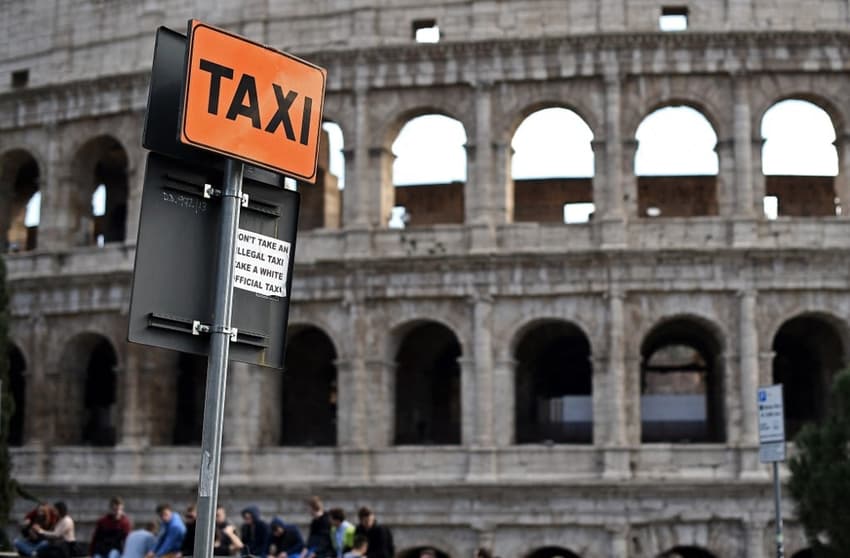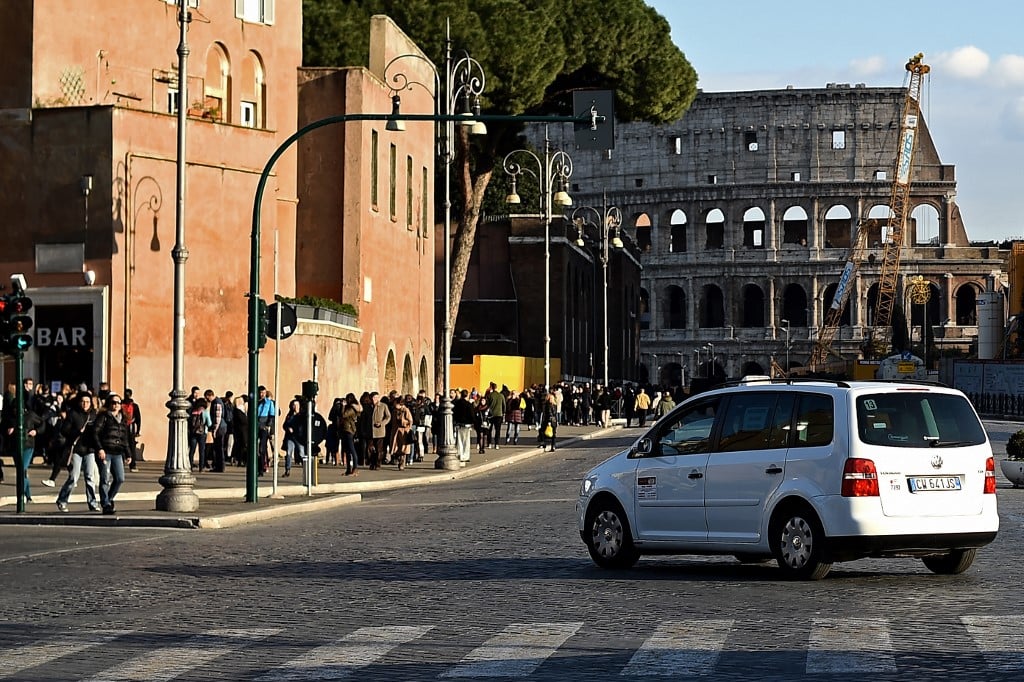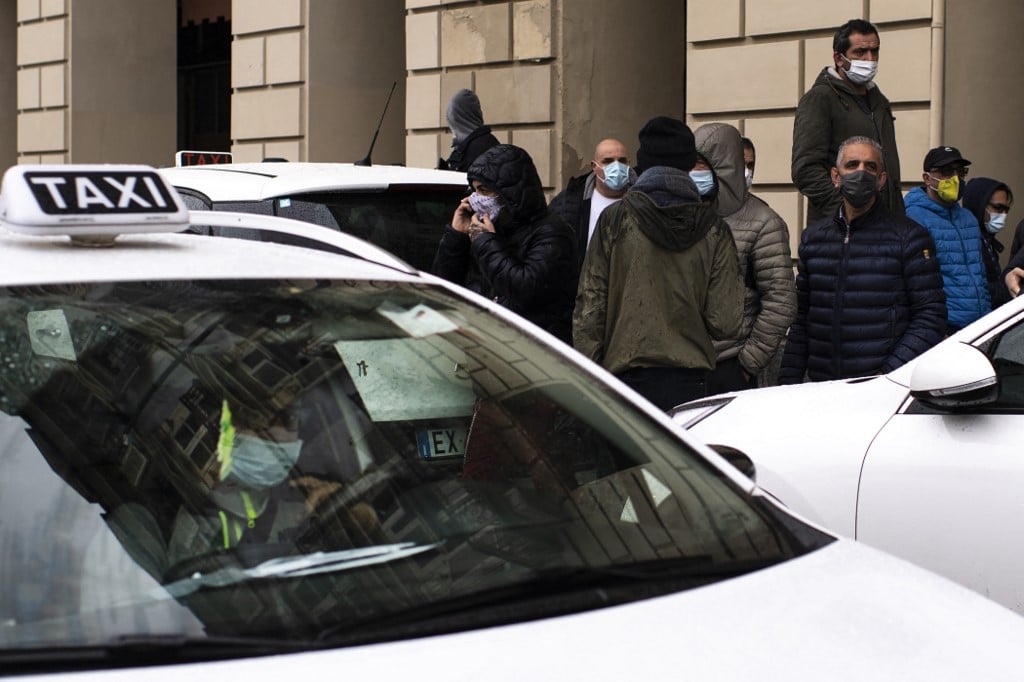'I've given up': How hard is it to get a taxi in Italian cities?

As Italy investigates the taxi sector over a worsening problem with long wait times and difficulties with cash payments, readers tell The Local what the situation is like in their cities.
The Italian government says it is looking at ways to increase the number of taxis on the roads in Rome, Milan and other cities, as the country’s competition watchdog this week begins an investigation into what it calls “critical issues” in Italy’s taxi sector.
The investigation comes following widespread reports of a severe shortage of taxis in major cities as well as complaints about some taxi drivers still refusing to take card payments.
Difficulties with getting a taxi in Italy are nothing new. But according to numerous reports in the national and international media in July, the return of large numbers of tourists post-pandemic has worsened the problem and put the country’s chronic transport issues back in the spotlight.
READ ALSO: Italy investigates taxi sector over long waits and payment issues
And many of The Local’s readers living in Italy say that the situation this summer really is as bad as it sounds.
“I have pretty much given up trying to call a taxi in Rome, for the past say two months taxis just did not seem to be available at all or with very long wait times,” reader Jamie, who lives in Rome, tells The Local.
“Sometimes the app will say that a taxi will arrive in a certain number of minutes but then the actual time is much longer.
“I used to use the Free Now app or one of the dispatch services, but none of them seems to be working well enough to be able to count on a taxi as a reliable option.”
In Florence, several readers report a similar situation.
“You can’t get a taxi for love nor money in Florence,” says city resident Nick Farraway.
“In the tourist season all of the taxis want to stay downtown inside the 'Vialle', so if you try to get a cab from any of the suburbs its absolutely impossible.”
And, he notes, “it’s amazing how often the card machine allegedly doesn’t work!”

A taxi passes Rome's Colosseum. Photo by Filippo Monteforte / AFP
In the nearby Tuscan city of Lucca, readers say taxis are also thin on the ground, while drivers seem to have the same recurring problems with their card readers.
“The taxi situation in Lucca is terrible,” says Art S., a resident of Lucca since 2019.
“There is a chronic shortage of available taxis. My wife and I waited for more than an hour a month ago. It was a holiday but no special events were taking place. Eventually a cab showed up and we were told that, on holidays, drivers quite often call in sick.”
“We have also had three or four occasions when drivers have asked for cash, claiming that their card devices weren’t working.”
“This country needs Uber,” he says.
READ ALSO: Why can’t I get an Uber in Italy?
Mary, who lives in the region of Molise, reported having particular problems with taxi drivers when visiting Naples and said the situation in Rome was better.
Mary was originally told a taxi from Naples’ main train station to the port would cost 13 euros. “On arrival, the driver changed it to 13 euros each,” she said. Then, on the return journey, the driver asked for 15 euros on the way but “on arrival at the railway station he changed it to 20.”
“We never had this experience in Rome, in fact city centre trips were all the same price: 10 or 15 euros last time we were there after Covid,” she says. “We have never used cards, always cash.”
“I think Rome taxi drivers' idea of all agreeing on one price for the city centre is the best service. Naples' taxi drivers, on the other hand, are giving Naples a bad name,” she says.
Why is this happening?
Italian cities have long experienced taxi shortages, with far fewer taxis in circulation than in other comparable European cities.
There is a large and seemingly growing disparity between supply and demand, which is widely believed to be perpetuated by efforts by Italy’s powerful taxi drivers’ lobby to stop local authorities from issuing any new taxi licences - despite the low number currently available.
In fact, neither Rome nor Milan has issued any new licences since 2006. An attempt this year by the mayor of Milan to issue 1,000 new licences was rejected by regional authorities under pressure from the taxi lobby.
READ ALSO: Why it's so hard to find a taxi in Italy this summer
Italy's taxi drivers fear an increase in the number of licences available would mean their own licences lose value for resale.
The price of a taxi licence varies by city, but current estimates put the average cost at between 100,000 and 200,000 euros - meaning the sector remains inaccessible to most would-be drivers, even when there are any licences available.
Taxi drivers’ unions have also held strikes to block efforts by a previous government to increase competition in the sector, ensuring that ride-hailing apps like Uber are not allowed to operate in Italian cities.
After striking a deal with taxi dispatcher IT Taxi last year, Uber Black – the ‘luxury’ version of the popular app – is now available in ten Italian cities, but services remain very limited.

Taxi drivers in Turin hold a protest in 2020. (Photo by MARCO BERTORELLO / AFP)
As for why Italy’s taxi drivers seem to have such frequent trouble with their card payment machines: they're not the only ones. As you might have noticed, these machines are often found to be malfunctioning in Italy’s smaller shops and businesses, too.
Taxi drivers and other merchants are legally required to accept card payments and can face penalties for refusing. But, even if the card machine is found to be in good working order, it's still not unusual to be asked if you have cash instead. You may also hear complaints that the processing fees for card transactions are too high.
Previous Italian governments have moved to incentivise electronic payments in order to cut down on the large number of cash transactions in Italy, saying that this contributes to the country's high rates of tax evasion.
However, the current government has taken a different stance. In 2022 it raised the legal limit for cash payments and attempted to introduce rules making it legal for merchants to refuse payment by card for amounts under 60 euros.
This move was ultimately blocked by the European Commission, who said it would encourage tax evasion, but the proposals appear to show that the ruling parties' support base - which includes many of Italy's small-to-medium sized business owners - still very much prefer payment in cash.
What's your experience of using taxi services in Italy? Please share your thoughts in the comments section below.
Comments (2)
See Also
The Italian government says it is looking at ways to increase the number of taxis on the roads in Rome, Milan and other cities, as the country’s competition watchdog this week begins an investigation into what it calls “critical issues” in Italy’s taxi sector.
The investigation comes following widespread reports of a severe shortage of taxis in major cities as well as complaints about some taxi drivers still refusing to take card payments.
Difficulties with getting a taxi in Italy are nothing new. But according to numerous reports in the national and international media in July, the return of large numbers of tourists post-pandemic has worsened the problem and put the country’s chronic transport issues back in the spotlight.
READ ALSO: Italy investigates taxi sector over long waits and payment issues
And many of The Local’s readers living in Italy say that the situation this summer really is as bad as it sounds.
“I have pretty much given up trying to call a taxi in Rome, for the past say two months taxis just did not seem to be available at all or with very long wait times,” reader Jamie, who lives in Rome, tells The Local.
“Sometimes the app will say that a taxi will arrive in a certain number of minutes but then the actual time is much longer.
“I used to use the Free Now app or one of the dispatch services, but none of them seems to be working well enough to be able to count on a taxi as a reliable option.”
In Florence, several readers report a similar situation.
“You can’t get a taxi for love nor money in Florence,” says city resident Nick Farraway.
“In the tourist season all of the taxis want to stay downtown inside the 'Vialle', so if you try to get a cab from any of the suburbs its absolutely impossible.”
And, he notes, “it’s amazing how often the card machine allegedly doesn’t work!”

In the nearby Tuscan city of Lucca, readers say taxis are also thin on the ground, while drivers seem to have the same recurring problems with their card readers.
“The taxi situation in Lucca is terrible,” says Art S., a resident of Lucca since 2019.
“There is a chronic shortage of available taxis. My wife and I waited for more than an hour a month ago. It was a holiday but no special events were taking place. Eventually a cab showed up and we were told that, on holidays, drivers quite often call in sick.”
“We have also had three or four occasions when drivers have asked for cash, claiming that their card devices weren’t working.”
“This country needs Uber,” he says.
READ ALSO: Why can’t I get an Uber in Italy?
Mary, who lives in the region of Molise, reported having particular problems with taxi drivers when visiting Naples and said the situation in Rome was better.
Mary was originally told a taxi from Naples’ main train station to the port would cost 13 euros. “On arrival, the driver changed it to 13 euros each,” she said. Then, on the return journey, the driver asked for 15 euros on the way but “on arrival at the railway station he changed it to 20.”
“We never had this experience in Rome, in fact city centre trips were all the same price: 10 or 15 euros last time we were there after Covid,” she says. “We have never used cards, always cash.”
“I think Rome taxi drivers' idea of all agreeing on one price for the city centre is the best service. Naples' taxi drivers, on the other hand, are giving Naples a bad name,” she says.
Why is this happening?
Italian cities have long experienced taxi shortages, with far fewer taxis in circulation than in other comparable European cities.
There is a large and seemingly growing disparity between supply and demand, which is widely believed to be perpetuated by efforts by Italy’s powerful taxi drivers’ lobby to stop local authorities from issuing any new taxi licences - despite the low number currently available.
In fact, neither Rome nor Milan has issued any new licences since 2006. An attempt this year by the mayor of Milan to issue 1,000 new licences was rejected by regional authorities under pressure from the taxi lobby.
READ ALSO: Why it's so hard to find a taxi in Italy this summer
Italy's taxi drivers fear an increase in the number of licences available would mean their own licences lose value for resale.
The price of a taxi licence varies by city, but current estimates put the average cost at between 100,000 and 200,000 euros - meaning the sector remains inaccessible to most would-be drivers, even when there are any licences available.
Taxi drivers’ unions have also held strikes to block efforts by a previous government to increase competition in the sector, ensuring that ride-hailing apps like Uber are not allowed to operate in Italian cities.
After striking a deal with taxi dispatcher IT Taxi last year, Uber Black – the ‘luxury’ version of the popular app – is now available in ten Italian cities, but services remain very limited.

As for why Italy’s taxi drivers seem to have such frequent trouble with their card payment machines: they're not the only ones. As you might have noticed, these machines are often found to be malfunctioning in Italy’s smaller shops and businesses, too.
Taxi drivers and other merchants are legally required to accept card payments and can face penalties for refusing. But, even if the card machine is found to be in good working order, it's still not unusual to be asked if you have cash instead. You may also hear complaints that the processing fees for card transactions are too high.
Previous Italian governments have moved to incentivise electronic payments in order to cut down on the large number of cash transactions in Italy, saying that this contributes to the country's high rates of tax evasion.
However, the current government has taken a different stance. In 2022 it raised the legal limit for cash payments and attempted to introduce rules making it legal for merchants to refuse payment by card for amounts under 60 euros.
This move was ultimately blocked by the European Commission, who said it would encourage tax evasion, but the proposals appear to show that the ruling parties' support base - which includes many of Italy's small-to-medium sized business owners - still very much prefer payment in cash.
What's your experience of using taxi services in Italy? Please share your thoughts in the comments section below.
Join the conversation in our comments section below. Share your own views and experience and if you have a question or suggestion for our journalists then email us at [email protected].
Please keep comments civil, constructive and on topic – and make sure to read our terms of use before getting involved.
Please log in here to leave a comment.